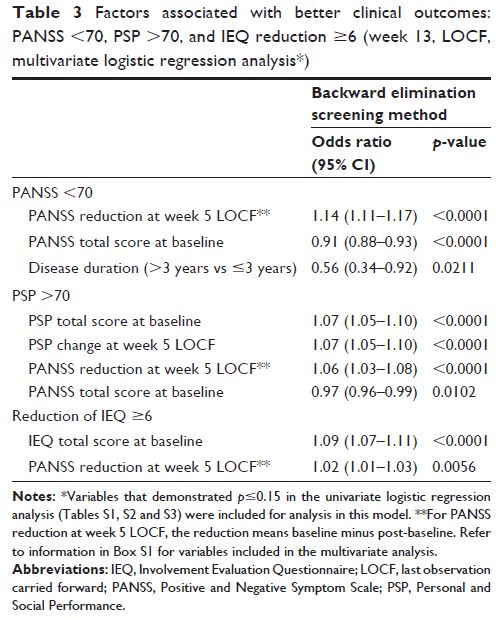108985
论文已发表
注册即可获取德孚的最新动态
IF 收录期刊
- 3.4 Breast Cancer (Dove Med Press)
- 3.2 Clin Epidemiol
- 2.6 Cancer Manag Res
- 2.9 Infect Drug Resist
- 3.7 Clin Interv Aging
- 5.1 Drug Des Dev Ther
- 3.1 Int J Chronic Obstr
- 6.6 Int J Nanomed
- 2.6 Int J Women's Health
- 2.9 Neuropsych Dis Treat
- 2.8 OncoTargets Ther
- 2.0 Patient Prefer Adher
- 2.2 Ther Clin Risk Manag
- 2.5 J Pain Res
- 3.0 Diabet Metab Synd Ob
- 3.2 Psychol Res Behav Ma
- 3.4 Nat Sci Sleep
- 1.8 Pharmgenomics Pers Med
- 2.0 Risk Manag Healthc Policy
- 4.1 J Inflamm Res
- 2.0 Int J Gen Med
- 3.4 J Hepatocell Carcinoma
- 3.0 J Asthma Allergy
- 2.2 Clin Cosmet Investig Dermatol
- 2.4 J Multidiscip Healthc

中国精神分裂症患者从口服抗精神病药改为每月一次使用帕潘立酮棕榈酸酯后,其症状、功能和护理负担改善的相关因素
Authors Li N, Feng Y, Lu HF, Cai SL, Zhuo JM, Si TM, Zhang LL
Received 28 November 2017
Accepted for publication 9 February 2018
Published 22 March 2018 Volume 2018:14 Pages 825—837
DOI https://doi.org/10.2147/NDT.S158353
Checked for plagiarism Yes
Review by Single-blind
Peer reviewers approved by Prof. Dr. Roumen Kirov
Peer reviewer comments 3
Editor who approved publication: Professor Wai Kwong Tang
Background: Paliperidone palmitate once-monthly (PP1M) demonstrated symptomatic and
functional remission in patients with schizophrenia. This post hoc analysis
aimed to identify factors associated with improved clinical outcomes in
patients switching to PP1M (75–150 mg eq.).
Methods: The improved patient outcomes were observed as Positive and
Negative Symptom Scale (PANSS, symptoms) score <70:66.7% (407/610), Personal
and Social Performance (PSP, function) score >70:34.3% (199/581), and
Involvement Evaluation Questionnaire (IEQ, caregiver burden) reduction ≥6:50.2%
(270/538). Independent variables including demographics, disease duration,
employment status, and clinical scores were screened individually using a
univariate analysis and subsequently, variables (cutoff p <0.15) were analyzed using a
multivariate regression analysis for association with better clinical outcomes
at week 13.
Results: The factors significantly associated with favorable clinical
outcomes were reduction in PANSS at week 5 (odds ratio [OR]=1.14, 95%
CI=1.11–1.17) with symptom reduction; baseline PSP total score (OR=1.07, 95%
CI=1.05–1.10), PSP change at week 5 (OR=1.07, 95% CI=1.05–1.10), PANSS
reduction at week 5 (OR=1.06, 95% CI=1.03–1.08) with functional improvement,
reduction in PANSS at week 5 (OR=1.02, 95% CI=1.01–1.03), and total IEQ score
at baseline (OR=1.09, 95% CI=1.07–1.11) with caregiver burden reduction.
Conclusion: Thus, symptom and functional improvements with caregiver burden
reduction were observed in patients, and PANSS reduction at week 5 was commonly
associated with favorable outcomes.
Keywords: caregiver burden, clinical outcomes, post hoc analyses, psychosocial
function, remission
